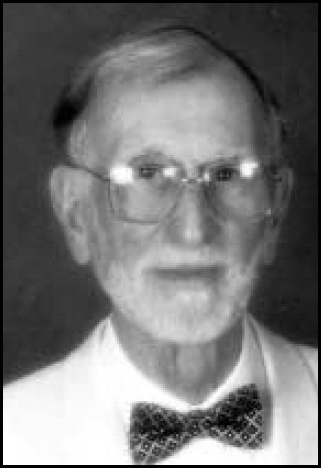
Formerly Lord Chancellor's Medical Visitor
Alan Heaton-Ward, who died on 2 June 2011 aged 91, was one of the most distinguished psychiatrists of his generation, and a courageous campaigner for better services for people with learning disability (intellectual disability) and their families. After retirement from clinical practice, he served as Lord Chancellor's Medical Visitor for the Court of Protection from 1978 to 1989.
Alan's parents were both teachers, but he himself always wanted to be a doctor. He won a scholarship as a day-boy to Queen Elizabeth's Hospital school, Bristol. Sadly, however, his father had died from wounds in Belgium in the First World War, when Alan was only 18 months old, so his mother could not afford to send him to university.
When he left school in 1936, Alan had to go to work, and started in one of the sought-after jobs in Wills Tobacco Company, which he hated. Fortunately, an inheritance from his grandmother in 1938 enabled him to take up a place at Bristol University Medical School, where, during his final year, he had his first exposure to psychiatry in Bristol County Mental Hospital (later Glenside Hospital). His interest was awakened, so that after completing his house-year at Bristol Royal Infirmary he began his first psychiatric job as an Assistant Medical Officer in the Oxford County Mental Hospital in Littlemore.
After serving in the Royal Naval Volunteer Reserve for 4 years, he became Deputy Medical Superintendent to Dr John Lyons in the Hortham-Brentry Group in Bristol, and thus began Alan's committed and distinguished career in the psychiatry of learning disability. In 1954, Alan was appointed Medical Superintendent of the Stoke Park Hospital Group, where he remained until 1978. During that time he was also Clinical Teacher in Psychiatry to the University of Bristol, and became involved in many charities associated with this field (horse riding was a particular interest).
He wrote and lectured extensively on all aspects of care and treatment of people with learning disabilities and on general psychiatric topics. His book Mental Deficiency (1952) ran to several editions, as did Mental Subnormality (1960) and Mental Handicap (1984). It was one of the few comprehensive texts available and the one used by people sitting the Diploma in Psychological Medicine and, from 1971, the MRCPsych. He gave the Blake Marsh lecture in 1976 and was the Burden Gold Medal and Prize winner in 1978.
Alan's appearance was as distinguished as his career. He was tall (6’ 5”) and very good looking. He had a keen intellect, a great sense of humour and had an unwavering commitment to people with learning disability and their families. His compassion was matched only by his anger at the neglect of services for these most vulnerable people to whom he devoted his life and for whom he campaigned vigorously and sometimes unconventionally.
In the 1960s, the psychiatric hospitals were grossly overcrowded and underfunded, to the despair of those working in them, who felt helpless and hopeless. Not, however, Alan Heaton-Ward - he, in his own words, ‘went on the offensive’. In 1971, a Health Advisory Service report critical of Stoke Park Hospital was published. Rather than try to defend the hospital, Alan told the press that the conditions were worse than stated in the report, and invited them to come and see for themselves! The Sunday Times published the story, which was followed by a BBC documentary. In 1974, Alan also arranged a visit by Marjorie Wallace, herself a noted campaigner for mental health, and now Chief Executive of SANE, which she founded. She wrote an encouraging article entitled ‘Hospital of hope’.
The consultant establishment increased, as did overall funding, while patient numbers fell with the gradual development of community services. This included out-patient clinics held in schools, adult training centres and other hospitals. A number of community nurses were appointed. Alan was emphatically not against community care, but was adamant that dispersed services should be vigorously supervised, as well as adequately funded.
Dr Heaton-Ward was active and respected at national and international levels. A hard-working Council Member of the Royal Medico-Psychological Association, he remained an enthusiastic supporter of the Association when, in 1971, it became the Royal College of Psychiatrists, of which he was a Foundation Fellow. Having been Chairman of the South Western Division and of the Mental Deficiency Section, he became Vice-President of the College from 1976 to 1978, serving while Professor Linford-Rees was President. He regarded this not only as a personal honour, but with typical modesty as a tribute to the Mental Deficiency Section, which had at last ‘come in from the cold’.
Alan was a member of the Mental Health Review Tribunal 1960-1978 and served on numerous mental health-related bodies. After his retirement in 1978, he enjoyed his time as Lord Chancellor's Medical Visitor, travelling extensively and always interested in observing variations in service provision across the country. He was elected a Vice-President of RESCARE in 1995.
Dr Heaton-Ward was an enthusiast for all forms of sport, particularly rugby (playing and supporting). He enjoyed gardening, travelling and, as he said, ‘asking why’.
Despite his national and international eminence, he remained indefatigable in his attempts to encourage better services for people with learning disability and their families. Together with Dr Joze Jancar, his old friend and colleague, and by their hard work and personal qualities, they did a great deal to raise the profile and status of the specialty. Right until the end, he remained mentally alert, enthusiastic and interested in everything to do with what had been his life's work. His health had not been good during the last year of his life, and he was cared for, with great devotion, by Betty, whom he married 5 years ago.
Alan is survived by Betty, his daughters Nichola and Lindsay, as well as his two grandchildren Jason and Jessica, all of whom were devoted to him.



eLetters
No eLetters have been published for this article.